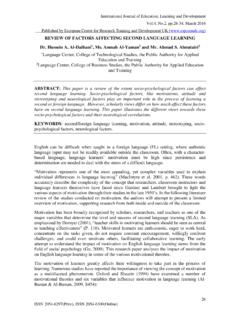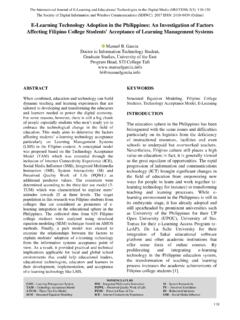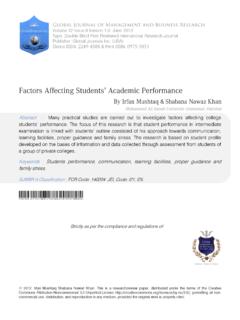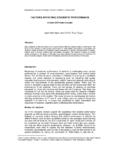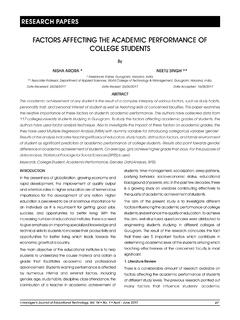Transcription of Factors affecting Learning and Memory: Implications for ...
1 Click to edit Master title style Factors affecting Learning and Memory: Implications for Intervention Aamir Malik Assoc. Prof., Univ. Tech. PETRONAS. 2016 INSTITUTE OF TECHNOLOGY PETRONAS SDN BHD. All rights reserved. No part of this document may be reproduced, stored in a retrieval system or transmitted in any form or by any means (electronic, mechanical, photocopying, recording or otherwise) without the permission of the copyright owner. Outline Introduction The Learning Process Memory Model Factors affecting Learning and Memory Long-term Memory Assessment Experimental Evidences of use of 3D.
2 Technology Neurofeedback Research References Introduction Learning and memory are two interrelated but different cognitive processes. Learning is a process to get new skills, knowledge and experience; while memory is the ability to retain the learned experience and reuse later Learning The acquisition of knowledge or skills through study, experience, or being taught.. any relatively permanent change in behaviour that occurs as a result of practice and experience . The Learning Process Concrete Experience (Activists). Accommodating Diverging Perception Active Reflective Experimentation Processes Observation (Pragmatists) (Reflectors).
3 Converging Assimilating Abstract Conceptualization (Theorists). Why Learning is the continuous Process Thinking Attitude Extend Continuous Creativity Knowledge Learning Levels Academic Reading & Curiosity Practice How Does Learning Occur? To explain how and when Learning occurs, a number of different psychological theories have been proposed. Classical Operant Social Conditioning Conditioning Learning Learning through Classical conditioning Before Classical Conditioning During Classical Conditioning After Classical Conditioning Operand Conditioning For example, when a lab rat presses a green button, it receives a food pellet as a reward, but when he presses the red button he receives a mild electric shock.
4 As a result, he learns to press the green button but avoid the red button. Social Learning Albert Bandura (1961). Four requirements for Learning : observation (environmental), retention (cognitive), reproduction (cognitive), and motivation (both). Memory Memory Types Short-term Long-term Sensory Memory (working Memory) Memory (< 1 sec). (20-30 sec) (life time). Explicit Memory Implicit Memory (conscious) (unconscious). Declarative Procedural Memory Memory (skills, tasks). (facts, events). How to do things, like running, swimming Episodic Memory Semantic Memory (events, experiences) (facts, concepts).
5 Memory Processes The three main processes involved in human memory are therefore encoding, storage and recall (retrieval). Additionally, the process of memory consolidation (which can be considered to be either part of the encoding process or the storage process). Memory Encoding: It allows the perceived information of interest to be converted into construct that can be stored within the brain, which can later be recalled. Memory Storage: It allows to retain the encoded information in the brain. Memory Retrieval/Recall: It refers to recollect the stored information from memory.
6 ENCODING STORAGE RETRIEVAL. Information External Information is Information is stored in INPUT placed in retained in memory is found memory memory as needed MEMORY MODEL. Environmental Selective Stimuli Iconic Gustatory Attention Memory Memory Storage Sensory Short-Term Long-term Memory Memory Memory Retrieval Echoic Haptic Memory Memory Information that is not encoded gets forgotten Information is forgotten due to interference, decay or retrieval failure Factor affecting Learning and Memory 18. Factors Working Sleep Caffeine Emotion Memory Recall or Intelligence Exercise Rehearsal Testing Visual and Multi- Attention Auditory lingual Combination 19.
7 Sleep Good night sleep and cognitive benefits: Enhanced Attention Learning become easy Better Problem-Solving Skills Improved Recall 20. Research studies linked Sleep with academic performance 21. A strong relationship is evident between good sleep quality and high academic performance. 22. Conclusion: Adequate sleep the night prior to an examination was positively associated with student course grades and semester GPAs. 23. Caffeine consumed no caffeine reported the highest grades with nearly 64 % reporting they earned mostly A's or A-'s in high school 24. Working Memory Outcome: Results reveal that children with sub-average school achievement showed deficits in working memory functioning, irrespective of intelligence.
8 By contrast, children with regular school achievement did not show deficits in working memory, again irrespective of intelligence. 25. Working Memory 26. Emotion Emotions Plays important role in Learning and memory Its drive attention, which in turn drives Learning and memory 27. Results indicated students' emotion regulation, general affective dispositions, and academic affect were related to each other, each of these variables also made a unique significant contribution to students' GPA. 28. Intelligence It is the ability to learn or understand or to deal with new or trying situations There is an established relationship between intelligence and Learning performance 29.
9 Outcome: The results of proper analyses are consistent with the conclusion that performance on Learning tasks and on conventional tests of intelligence, or IQ, both reflect common Factors , principally Spearman's g, or the general factor common to all cognitive abilities. 30. 31. Exercise Exercise Improves Cognitive functions Regular exercise changes the brain to improve memory, thinking skills 32. Results demonstrate that controlled training (CT), if performed with an appropriate combination of speed and duration, improves memory performance and neurogenesis. 33. Recall or Testing Testing or retrieval practice is the process in which the studied items or stored memory are recollected The testing effect was first studied by Karpicke and Roediger in comparison with rehearsal for long-term retention Proportion of memory recall in three different retention durations for rehearsal and testing effects Recall or Testing In short-term retention, SSSS' condition recalled more than the rest of two conditions SSST' and STTT'.
10 However, the recalled performance was reversed for long-term retention The work of Karpicke and Roediger Comparison of three experimental conditions for memory retrieval with two types of retention intervals (S=Study; T=Test). Attention Working Memory capacity is limited Attending to (focusing on) a fact/event will increase the likelihood of memorization. The acceptable view among the memory experts of this relation between attention and memory is that focusing on or attending to a fact or event means allocation of processing resources of the brain for certain task Rehearsal The functions of rehearsal are to maintain information active in the working memory and to create new memory traces for long-term retention Multi-lingual We use language to communicate our thoughts and feelings.

